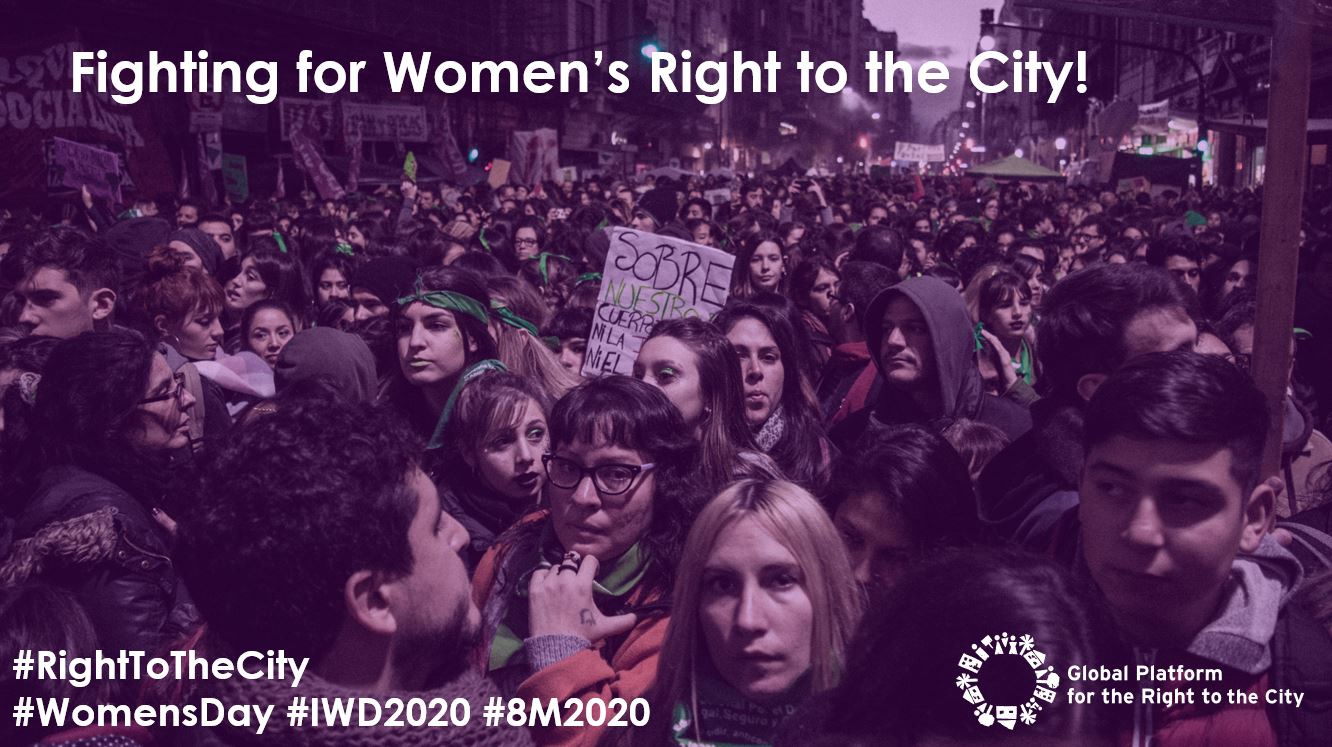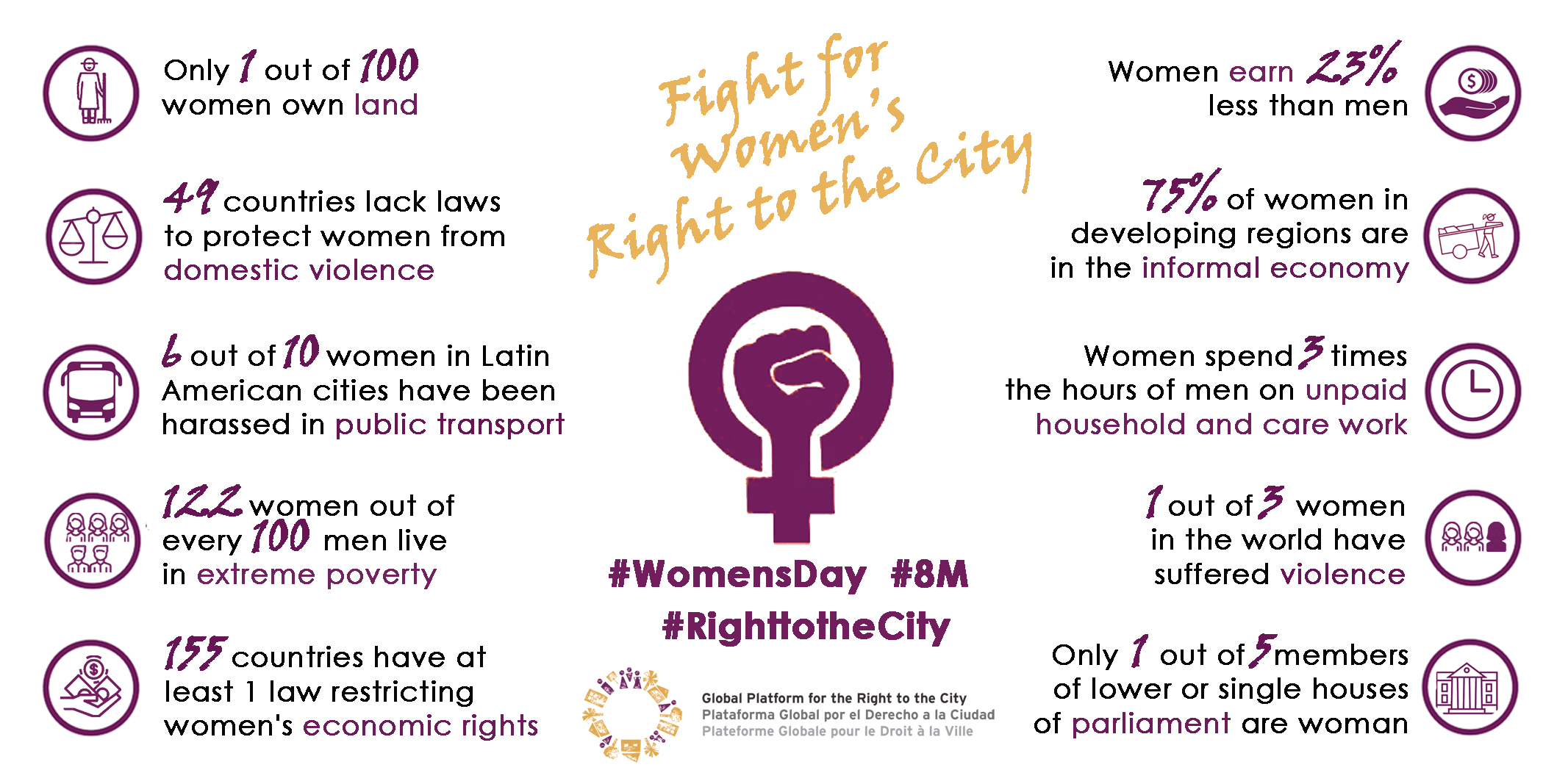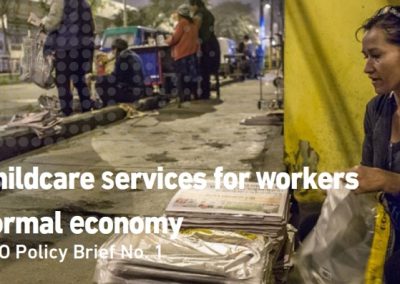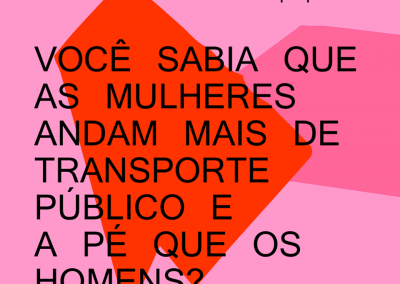
As every year, on March 8 we celebrate International Women’s Day. This day and the month of March as a whole is a key moment in the feminist struggle around the world. Gender equality is one of the eight components of the right to the city and one of its central elements. There can be no right to the city without gender equality!
From the Global Platform for the Right to the City (GPR2C) we fight for cities and human settlements that adopt all necessary measures to combat discrimination against women and girls in all its forms; for cities/human settlements that take all appropriate measures to ensure the full development of women and girls, guaranteeing them equality in the exercise and realization of human rights, and a life free of violence.
Women’s Right to the City Manifesto
We join the global mobilization, calling for Women’s Right to the City and making visible the contribution of organizations working on this issue. As Ana Falú, coordinator of the GPR2C’s Gender Working Group explains in this article, “talking about the Right of Women to the City is a matter of social justice, of changing the cultural paradigm, to understand not only the complexity of cities but also of identities, the people for whom we are advocating the Right to the City”.

In 2019, the GPR2C launched a manifesto for Women’s Right to the City developed by its Gender Working Group and supported by 29 social, academic, political and grassroots leaders and representatives at the international level. The document responds to the question “Why do we speak of Women’s Right to the City?” With 11 central points to ensure the Right to the City of Women. In this video 10 expert women leaders and activists from around the world who fight for gender equality and the Right to the City explain some of the central themes of the manifesto.
The Right to the City at International Women’s Day 2020
Women’s Right to the City has a political and theoretical value. Political because of the capacity to transform and theoretical because of the need to build arguments, knowledge, to promote that necessary political action. The gender and feminist view is essentially transversal and touches all the components of the Right to the City and of GPR2C’s work.
For this reason, many of the organizations that make up the GPR2C have been developing campaigns and activities for International Women’s Day from their diverse fields of work: right to housing, quality public spaces, diverse and inclusive economies, among others. In this page we gather some of these campaigns and initiatives, as well as materials and publications that show the diversity and richness of views on Women’s Right to the City .
Throughout March we will be updating this page with more content. If you know of any activity, initiative, campaign or material that could be of interest, do not hesitate to contact us at: communicationteam@hic-net.org.
Campaigns for International Women’s Day 2020
WIEGO (Women in Informal Employment: Globalizing and Organizing): Campaign for quality childcare
Nearly one billion women work in the informal economy, and the vast majority lack any support for childcare. Few public investments will have such a transformative effect on equality between women and men and between social classes as investment in child care.100 years after the adoption of the first ILO Convention on maternity protection, WIEGO and the ILO are launching a series of policy briefs on the current state of quality public child care services. In the documents, 3 new ways of looking at the urgent need for quality child care are explored. Learn more + podcast on child care for informal workers
CISCSA (Centro de Intercambio y Servicios Cono Sur Argentina): Campaign “Cities free for all”
On the occasion of International Women’s Day, Ciscsa launches the “Cities free for All” campaign to make visible the multiple forms of violence that women suffer in public spaces. This is a brief survey in which women and dissident identities from all over Latin America will share their experiences in the city, contributing to create a participatory mapping that, although exploratory, contributes to make visible and recognize these violences that seriously affect women’s lives and that daily limit their free circulation, mobility, use and enjoyment of the cities. Answer and share the survey (in spanish)
Instituto Polis: Women and Right to the City Campaign
Dando continuidad a la campaña por el Derecho a la Ciudad en el carnaval y a las campañas de 2019 enfocadas en el derecho a la ciudad de las poblaciones negra y LGBTQ+ en marzo el Instituto Pólis lanza un llamado sobre el derecho a la ciudad de las mujeres, enfocado en cinco temas principales: mujeres en la política, movilidad urbana, red de cuidados, espacios públicos y vivienda. Por una ciudad imaginada y construida por y para las mujeres con experiencias de vida que desafían directa y diariamente las estructuras sexistas, racistas y clasistas: así se reclamama el Derecho a la Ciudad. Saber más. Y si estás en Sao Paulo, ¡súmate a la intervención del Instituto Pólis en la Marcha del 8M en MASP!
Giving continuity to the campaign for the Right to the City in the Carnival and the 2019 campaigns focused on the right to the city of black and LGBTQ+ communities, in March Pólis Institute launched a call for the right to the city of women, focusing on five main themes: women in politics, urban mobility, care network, public spaces and housing. For a city imagined and built by and for women with life experiences that directly and daily challenge sexist, racist and classist structures: this is how the Right to the City is claimed. Learn more (in portuguese). And if you are in Sao Paulo, join the Pólis Institute’s intervention in the 8M March in MASP!
Materials and documents on Women’s Right to the City:
- Policy Paper on gender equality and local governments for UCLG Congress in Durban 2019
- Vídeo on feminist Urbanism – Collectiu Punt6
- Vídeo on women and housing cooperatives, FUCVAM (in spanish)
- Publication ““Women’s power in food struggles” from the Global Network for the Right to Food and Nutrition
- “Women want to be different, not unequal”, interview of Ana Falú in El País (in spanish)
- Why we talk about women’s Right to the City?, article at GPR2C’s web
- Women security in 10 countries, Report ActionAid
- Cities questioned by feminisms, Artícle by Habitar Argentina
- Women’s agenda for the City in Latin America
- Experience of intervention “to inhabit our bodies, our homes, our communities”, Madre Tierra
- “The crisis is gendered” article by Rosa Luxemburg Stitfung
- Women’s role in the history and collective memory of neighborhood upgrading in Medellín, Centro de Desarrollo Cultural de Moravia and Coinvite (in spanish)
- Who are home based workers? video from HomeNet South Asia Trust
- «Urbanism can be a tool for redistribution and for teh care network», interview with Zaida Muxí
- “Five ways to achieve SDGs through grassroots change”, artícle by WIEGO







